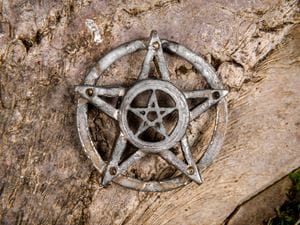
Shutterstock.com
It is arguable, however, that no religion is as universally baffling to outsiders as Neopaganism. Neopaganism is considered by outsiders to be alternately devil worship, a cult, a collection of purely social practices, filled with ritual sex or animal sacrifice and not a real religion at all. None of these, however, are true.
Neopaganism is a collection of diverse beliefs that are based on the pagan religions of ancient times. Some pagan paths, such as Asatru or Heathenry, work to make their practices historically accurate while accounting for social change. Other paths are only loosely based on the original pagan rituals but still worship the old gods. There are also paths that fall somewhere in the middle. This diversity of beliefs is due in part to the fact that pagan groups lack a formal dogma. There are commonalities among different pagan paths, but there are always exceptions. A belief in both a god and goddess is common in Wicca, for example, but there are many pagans who worship an entire pantheon or a single deity. There are even some Wiccans who reject the idea of a god and goddess.
The lack of a formal creed in Neopaganism can make it difficult for curious outsiders to learn about pagan beliefs. The answers to almost every question are “yes and no,” “it varies among pagans” or “sometimes but not always.” This can lead to well-meaning outsiders getting frustrated and throwing up their hands.
Some of the most common questions from outsiders, and some of the questions most likely to lack “satisfying” answers, are those about magick. Magick is central to many pagans’ practices and is arguably one of the defining features of the Neopagan religions. It is also something that confuses many outsiders. In the modern world, it seems very strange that belief in magick is growing. Yet, the number of Neopagan adherents continues to swell and with it the number of magickal practitioners. So, what is magick and why is it spelled with a “k”?
The first thing to understand is that not all pagans spell magick with a “k.” Some find the practice archaic and unnecessarily cumbersome. Instead, they just use the word “magic.” The k-spelling, however, is favored among many pagan traditions because it differentiates “magic” and “magick.”
To pagans, magic can refer to two different things. The first is the illusions and tricks found in a magician’s stage show. These gimmicky but often enjoyable performances have little to do with the deeply spiritual rituals used by many pagans. Given that magick for many pagans is a deeply emotional way of practicing and living out their faith, they prefer to make a clear distinction between the spiritual magick of Neopaganism and the smoke and mirrors of a stage magician.
Magic can also refer to the supernatural and superhuman abilities found in stories such as “Harry Potter” and “Lord of the Rings.” Magic in such fantastical stories comes in the form of beams of light, fireballs shooting out of wands and mystical words. No pagan expects to be able to throw fire around their house or turn dishes into cats after a magickal working. Outsiders, however, sometimes assume that pagans believe they will achieve these impossibilities if they practice magick. Neopagans often have to face down the belief that they are not practicing a “real religion,” so many use the k-spelling of magick to help add some legitimacy to their spiritual rituals.
So, what is magick? The answer, unsurprisingly, is “it depends on who you ask.” Many different pagan traditions have different definitions for this hallmark of Neopaganism, and individual pagans will have further variations on those answers. The underlying theme among these various answers is that magick is the use of energy to achieve a desired outcome. The energy used in magick is believed to have slightly different sources depending on the pagan path. Druids, for example, call this energy nwyfre and believe that it is the energy created by and present in all forms of life. Wiccans hold that magick is the energy of the cosmos and the essence of creation.
To use magick, Pagans tap into the magickal energy and manipulate it to create a desired result. In many paths, this is seen as subtly manipulating the fabric of reality itself. Unsurprisingly, how a ritual, spell or divinatory reading is done varies wildly among Neopagans. Wiccans tend to favor more ritual practices. These rituals are not formal and can be created on the spot, but they tend to involve ritual elements such as casting a circle, welcoming the elements and utilizing magickal tools such as crystals, candles and incense. Other pagan paths require nothing more than a practitioner’s calm focus.
Neopagans also disagree on the role the practitioner plays in the magickal working. Wiccans tend to see themselves as working to collect, shape and release the energy themselves. Asatru pagans, on the other hand, feel that they are channeling the energy through their gods.
Magick tends to baffle non-pagans and can even leave some veteran pagan practitioners confused. There are so many different answers, methods and goals for magick that it is no wonder people get confused. Everything about it, from its spelling to how it is implemented, varies from tradition to tradition and person to person. Some people prefer to use a complex and formal ritual for divinatory purposes. Others do their magick for two minutes in the bathroom before a job interview to help them achieve success. In this way, magick exemplifies the very essence of Neopaganism: individualistic spirituality without a set creed. Pagans can more or less use magick by whatever method and for whatever purpose they desire. That said, baffled outsiders do not need to be afraid of an angry pagan turning them into a frog. It is impossible, and most pagans live by the ideals contained in the famous Wiccan Rede: “Do as ye will, so long as it harms none.”

